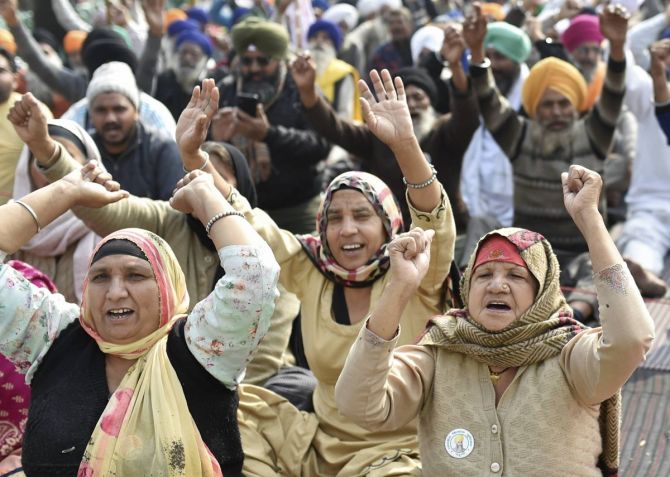'The issue is not whether the farm laws are beneficial for the farmers or not.'
'The farmers have taken a stand that they do not want these laws.'
'Why do you want to thrust these laws down their throat?'

Agriculture economist Sardara Singh Johl has been insisting for the past three decades that farmers of Punjab need to diversify their crops and not produce only rice and wheat.
Dr Johl has presented papers, given lectures on farming and advised different governments on the necessary measures to save farming and farmers.
Unfortunately, although they were accepted by various governments, his advice and reports were never actually implemented.
Speaking to Rediff.com's Syed Firdaus Ashraf on the ongoing controversy over the three contentious farm laws, Dr Johl, 92, says, "The government should make these laws advisory. The states who want can enact these three farm laws and those who don't, let them be out of it."
While reading your work, it looks like successive governments only believed in keeping experts like you engaged while not acting on your recommendations. Why?
I have given many reports to different governments.
One I gave in 1986 about diversification of crops. I revised that report in 2002.
But no government took action on those reports too.
Why were those reports stuck in red tape?
It is because there was no seriousness from the government's side.
Today in Punjab, the water level is going down every year by 30-35 cm. Unlike earlier, it has become difficult to find potable ground water.
The prime reason for this is ground water consumption in rice farming.
I had suggested that the government must diversify crops so that less water is consumed.
This could have been done by taking 10 lakh hectares of land from farmers after compensating them and growing some other crop.
I had spoken to the ministry of food and agriculture at the Centre then because they were importing Rs 14,000 crore (Rs 140 billion) worth of oil seeds and pulses.
I told the central government to give farmers Rs 1,600 crore (Rs 16 billion) to diversify their crops from wheat and rice to oil seeds and pulses. They agreed and gave the money to the agriculture ministry.
Later, the matter got stuck there and this was not followed up either politically or administratively.
No one showed any interest in it. The reason being, these things don't bring votes to political parties.
They are happy to announce free electricity to farmers with that sum of money to get votes.
And this results in huge loss to agriculture. There will be water problems in future because we are growing (only) rice and wheat (in Punjab) and this will cost future generations for sure. We are eating our children's money.
Were the farmers ready to accept diversification of crops?
They would have if the compensation was given. I had clearly written all the details to which the agriculture ministry agreed.
But there was no political will to implement it on the ground.
Later, I asked for $8 million from the World Bank and they too agreed to finance. But, unfortunately, elections came and political parties announced free electricity to farmers and that project too got stalled.
Political parties only want votes. They don't bother about agriculture. They don't care for land, water, farms or anything except announcing free electricity to get votes.
Nowhere in the world does farming survive without government support but announcing free electricity is not a solution.
Instead, if you give money into farmer's accounts directly, they will automatically pay electricity bills.
Now, political parties are announcing everyone will be given free mobile phones etc. Are these the ways to tackle the problems of any state?
Vote bank politics has created problems for farmers. This is true for every party who go on promising things to them.
The Central Ground Water Board in 2019 predicted that in 25 years, Punjab will turn into a desert due to the overdrawing of ground water and still no one seems to do anything about it. In this scenario, do Punjab farmers not realise that excessive rice and wheat production is bad for their future?
This is going to happen. Punjab will become a desert.
Today, drinking water is found at least 300 feet below the ground. And slowly this will also be over.
We are drawing water that is meant for our future generations. Where will they get water from? No one wants to think about it.
Don't the farmers realise this danger?
They don't understand and it is the government's job to make them understand.
Today, we have very cheap politicians. There is a difference between a politician and a statesman.
Politicians only think of elections while statesmen think of future generations.
This is the crux of the problem as we don't have statesmen either in central or state-level politics.
Where do you get men like Lal Bahadur Shastri or Atal Bihari Vajpayee? This is the problem of India as we do not have statesmen.
You have spoken in the past of giving up faulty cropping practices and going in for aerobic cultivation of rice in Punjab to save water. What happened to that?
The government does not take them seriously. The politicians don't see long-term loss to the country by not implementing such ideas.
Agriculture economists are divided over the three farm laws. Can't there be a middle ground?
The issue is not whether the farm laws are beneficial for the farmers or not. The farmers have taken a stand that these laws will have to be repealed.
The farmers are very clear that they do not want these farm laws.
It is very clear that the community for whom you have made these laws, does not like them. Why do you want to thrust these laws down their throat? Repeal them and let them come up with something new.
The problem started because the central government brought these as ordinances, which was not required.
And even between issuing ordinances and bringing the bills in Parliament, they had six months in which they could have placed the bills in the public domain, which they did not do.
Stakeholders were not taken into confidence. They then put up the bill the in Lok Sabha which was passed with their majority and Question Hour discussion was not allowed too.
The Opposition wanted the bills to go to a select committee, but that too was refused.
In the Rajya Sabha, too, they did the same thing (passed the laws dubiously) which created a trust deficit.
So, I feel the government must send these laws back to Parliament for a review and include farmers' viewpoints in the discussion.
After which, whatever law Parliament passes should be accepted.
And such a bill must be passed by a two-thirds majority.
Today we want peace in India. The economy is suffering, the farmers are suffering and there is no peace.
The situation is getting worse day by day. The government has to step in to get the situation under control.
Now it is irrelevant whether the farm laws are good or bad as the farmers don't want them.
Only farmers from Punjab, Haryana and Western Uttar Pradesh to some extent are opposing the farm laws. There is no protest from farmers in other parts of India.
The government can say these laws are advisory. The states that want these laws can enact them and the states that don't may opt out of it.
Like every state fixes its own price for sugarcane and the Commission for Agricultural Costs and Prices only issues advisories.
Let respective state governments have their choice.
I feel, let these farm laws be repealed and then sent back to Parliament and begin the process again, which will be more acceptable.
That will be humiliating for the government.
Obviously, but what the government did was undesirable.
The government should have adopted a proper process, which they did not. Therefore the situation is going out of hand.
Landholdings are reducing in each family due to increase in number of siblings over generation. In this scenario, do you think farming as a profession is economically unviable for a family of four on two acres of land?
The problems of two-thirds of the farmers of Punjab and 80 per cent of Indian farmers' income cannot be solved by the farm sector.
Every other expert says grow this vegetable and grow that, but where is the market to consume those farm products? Who will buy them? Nobody sees that.
The solution to farming troubles is that it has to be part-time.
You do farming along with some other job, say, in a factory or workshop.
Only when if you do this, you will be able to sustain farming.
This is happening in Japan and China. You may say that you will double agricultural income, but that is not going to happen.
Do we need something like a green revolution for farmers?
Yes, something like that where a small farmer becomes a part-time farmer.
You have to integrate industrial and service sectors with agriculture.
Till the time these sectors are not integrated with agriculture, no good can be done for farmers.











 © 2025
© 2025